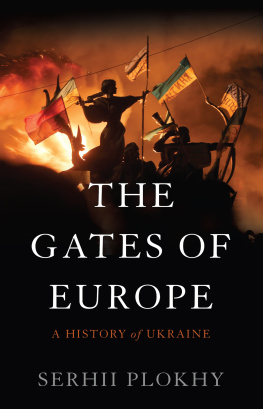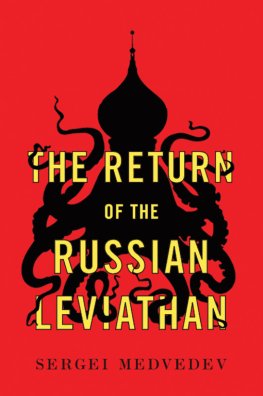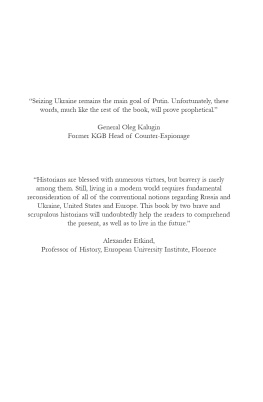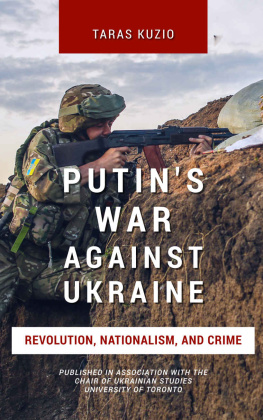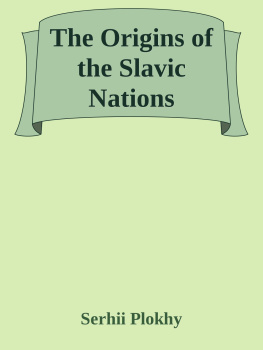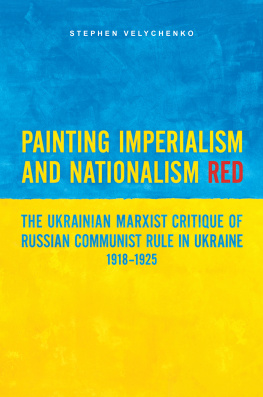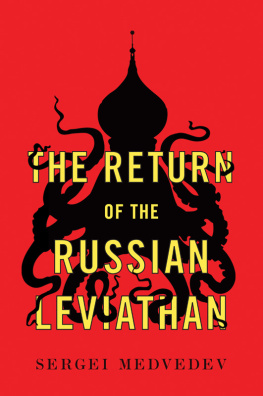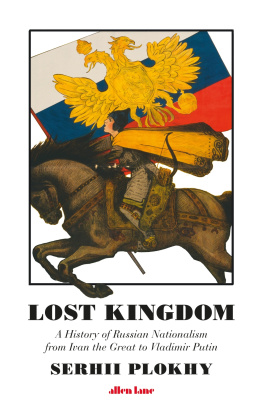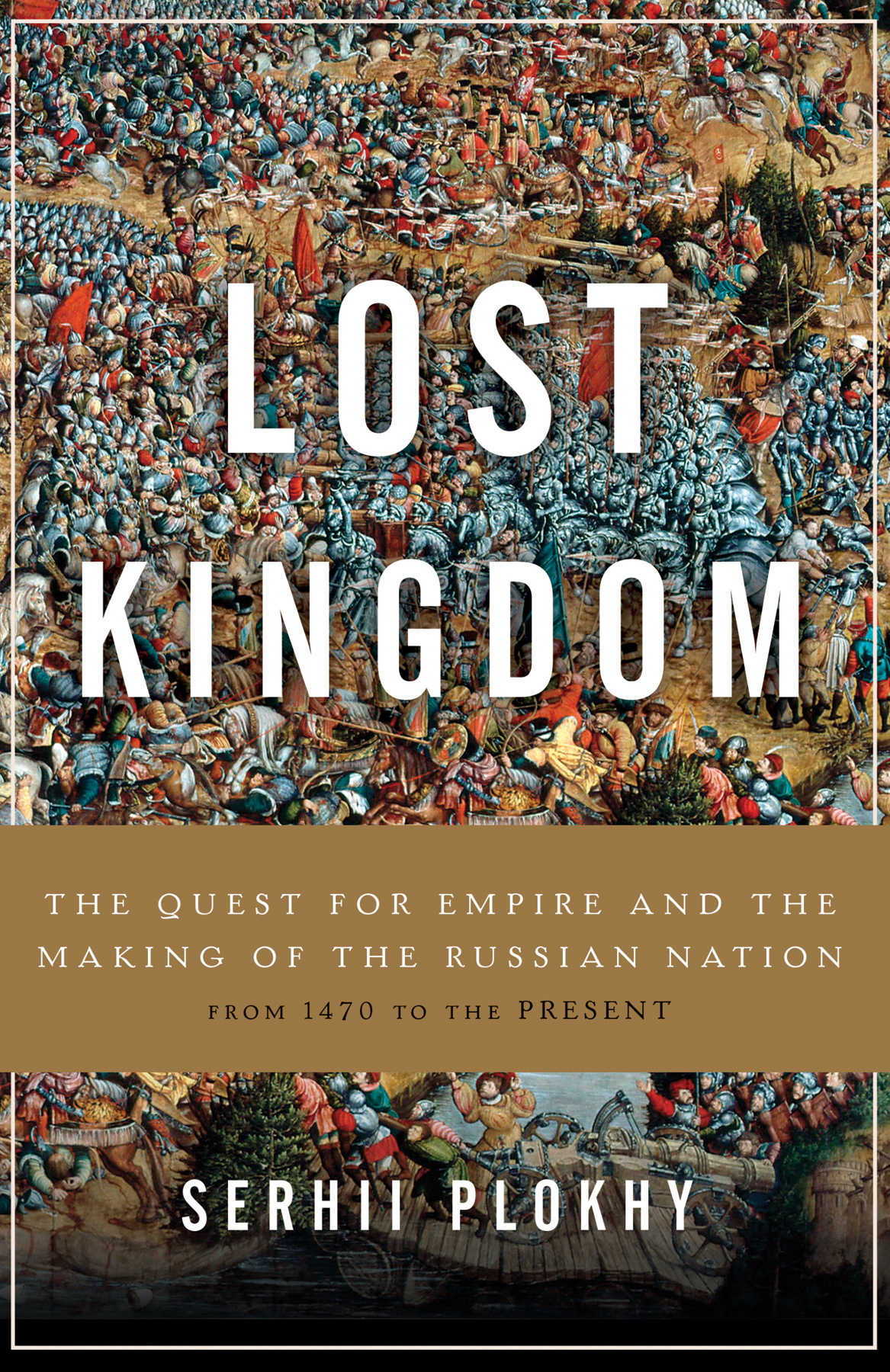Copyright 2017 by Serhii Plokhii
Hachette Book Group supports the right to free expression and the value of copyright. The purpose of copyright is to encourage writers and artists to produce the creative works that enrich our culture.
The scanning, uploading, and distribution of this book without permission is a theft of the authors intellectual property. If you would like permission to use material from the book (other than for review purposes), please contact permissions@hbgusa.com. Thank you for your support of the authors rights.
Basic Books
Hachette Book Group
1290 Avenue of the Americas, New York, NY 10104
www.basicbooks.com
First Edition: October 2017
Published by Basic Books, an imprint of Perseus Books, LLC, a subsidiary of Hachette Book Group, Inc.
The Hachette Speakers Bureau provides a wide range of authors for speaking events. To find out more, go to www.hachettespeakersbureau.com or call (866) 376-6591.
The publisher is not responsible for websites (or their content) that are not owned by the publisher.
PRINT BOOK INTERIOR DESIGN BY LINDA MARK.
Library of Congress Cataloging-in-Publication Data
Names: Plokhy, Serhii, 1957 author.
Title: Lost kingdom : the quest for empire and the making of the Russian nation, from 1470 to the present / Serhii Plokhy.
Description: New York : Basic Books, 2017. | Includes bibliographical references and index.
Identifiers: LCCN 2017021215 (print) | LCCN 2017021309 (ebook) | ISBN 9780465097395 (ebook) | ISBN 9780465098491 (hardback)
Subjects: LCSH: NationalismRussia. | NationalismSoviet Union. | RussiaHistory. | RussiaTerritorial expansion. | Soviet UnionHistory. | Soviet UnionTerritorial expansion. | UkraineHistory. | BelarusHistory. | ImperialismHistory. | BISAC: HISTORY / Europe / Eastern. | HISTORY / Europe / Russia & the Former Soviet Union.
Classification: LCC DK43 (ebook) | LCC DK43 .P56 2917 (print) | DDC 947dc23
LC record available at https://lccn.loc.gov/2017021215
E3-20170831-JV-NF
I N THE VERY HEART OF Moscow, ACROSS THE SQUARE FROM THE Borovitsky Gate of the Kremlin, stands one of the tallest monuments in the Russian capital. The statue of a man in medieval garb, with a cross in one hand and a saber in the other, is eighteen meters high. The man is Prince Vladimir, as he is known today to the citizens of Russia, or Volodimer, as he was called by medieval chroniclers. He ruled from 980 to 1015 in the city of Kyiv (Kiev), where he is known today as Volodymyr, and left a lasting legacy by accepting the Christian religion for himself and his realmthe medieval state of Kyivan Rus, which included vast territories extending from the Carpathian Mountains in the west to the Volga River in the east.
Many in Moscow believe that the impulse to erect the monumentwhose height and central location make it more prominent than the one to Prince Yurii Dolgoruky, who is alleged to have founded Moscow in 1147was based on a desire to glorify none other than St. Volodymyrs namesake, the president of Russia, Vladimir Putin. After all, it was Archimandrite Tikhon, rumored to be Putins confessor, who headed the committee that chose the winner of the hastily organized competition. Moreover, the site chosen for the monument was in a historical zone protected by UNESCO and thus required a special permit from the Moscow City Council, which could be obtained only with the blessing of the Russian president.
But the real or imagined connection between Prince Volodymyr and President Vladimir Putin offers only part of the explanation for the importance of the monument and the reasons for its erection in the heart of Moscow. More than anything else the monument symbolizes the Russian claim for Kyivan heritage and underlines the importance of Kyivan Rus for the historical identity of contemporary Russia. Otherwise, what would a monument to a prince of Kyiv, the capital of the neighboring state of Ukraine, be doing in such a coveted space in the heart of the Russian capital? The timing and circumstances of the monuments construction further stress the importance of Ukrainian themes in Russian history and politics. The first stone in its foundation was laid in 2015, soon after the Russian annexation of the Crimea, and was taken from that peninsula in the middle of the Russo-Ukrainian war. It was brought to the Russian capital from the site of the Byzantine city of Chersonesus, the legendary place of the baptism of Prince Volodymyr in 988.
The monument was officially unveiled on November 4, 2016the Day of National Unity, a statutory holiday in Russiaby Vladimir Putin himself. The Russian president delivered a speech in the presence of the head of the Russian government, Dmitrii Medvedev, Patriarch Kirill of the Russian Orthodox Church, and the widow of Russias most celebrated national writer, Aleksandr Solzhenitsyn. Vladimir Putin praised Prince Volodymyr as a of the Russian lands and a prescient statesman who laid the foundations of a strong, united, centralized state, resulting in the union of one great family of equal peoples, languages, cultures, and religions. Putin pointed out that the princes choice of Christianity became the joint spiritual source for the peoples of Russia, Belarus, and Ukraine, laying the foundations of the morals and values that define our life even to the present day.
D ESPITE WHAT ONE READS IN TEXTBOOKS AND HEARS IN OFFICIAL pronouncements, Russia, especially by European standards, is a relatively young state. Its history as an independent polity officially begins less than six hundred years ago, in the 1470s, when Ivan III, the first ruler of the Grand Duchy of Muscovy to call himself tsar, challenged the suzerainty of the Mongol khans. At stake was not only the independent status of the rulers of Muscovythe principality centered on the city of Moscowbut also their control over other Rus lands, in particular Novgorod, whose independence from Moscow the Mongol khans sought to maintain. It was then that the Kyivan roots of the Muscovite dynasty and church helped form a powerful myth of origin that distinguished Muscovy from its immediate Mongol past and nourished its self-image as heir to Byzantium.
Most of Russias wars were fought in its immediate East Slavic neighborhood, motivated and justified by its claim to be the legitimate political, cultural, and religious successor to the medieval state of Kyivan Rus and its Byzantine heritage. Even the extension of the Soviet borders westward in the course of World War II was often justified with references to the Rus princes and their military exploits. Despite Russias long history of imperial conquest, its vision of gathering the Rus lands, initiated during the reign of Ivan III, was fulfilled only during the brief period from 1945 to 1991less than half a century. In those years of superpower status, Moscow was able to extend its rule to the westernmost regions of the old Kyivan state, settled predominantly by Eastern SlavsUkrainian Galicia, Bukovyna, and Transcarpathia.
The Russian elites claim for the Kyivan inheritance developed from a largely dynastic and religious concept into an ethnonational one with the start of the modern era. As the Russian Empire embraced the idea of nationality in the course of the eighteenth century, it created a particular model of Russian nationhood that included todays Russians, Ukrainians, and Belarusians along with imperial elites of non-Slavic origins that were Russified in political and cultural terms. The Russian Revolution began the process of untying this imperial knot of Russian national identity by assigning the status of separate nationalities to the Russians, Ukrainians, and Belarusians. Nevertheless, the Soviet project was anything but consistent in terms of its nationality policies. The communist government centralized the decision-making process in Moscow, used the Russian language across the whole expanse of the Union of Soviet Socialist Republics (USSR), promoted the cultural Russification of non-Russians, and in doing that created conditions for the development of post-Soviet Russian imperialism after the collapse of the Soviet Union in 1991. The emancipation of Russian national identity from this neo-imperialism is the main challenge besetting the countrys current search for a new identity.



